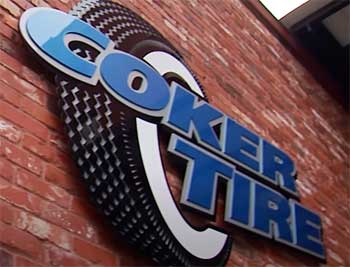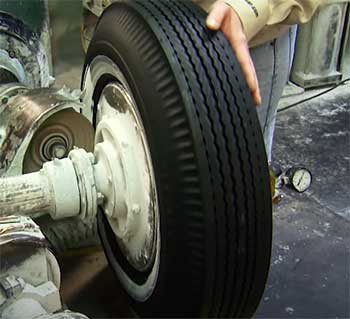If you’ve heard about Coker Tires, you’d probably associate them with vintage, classic, or collector’s automobiles. These aren’t your run-of-the-mill tires for everyday cars.
They’re quite the niche product, offering specialty tires to car enthusiasts worldwide. Despite their premium reputation, however, like any product, Coker Tires do have their share of problems.
Let’s delve into these issues to better understand the Coker tires.
Problems With Coker Tires
- Uneven Wear

One commonly reported problem with Coker tires is uneven tire wear.
Tires should ideally wear down uniformly over time, maintaining their overall shape and ensuring stability and balance when driving.
However, some Coker customers have reported their tires showing uneven wear, leading to a shorter lifespan and potentially unsafe driving conditions.
While some uneven wear can be due to poor vehicle maintenance or misalignment, repeated customer complaints suggest the issue may also lie with the tires themselves.
Also Read: Belle Tire Protection Plan Reviews.
- Tire Balancing Issues
Another issue pertains to balancing. While a certain amount of rebalancing is normal for any tire, some Coker Tire users have reported a persistent problem with maintaining tire balance.
This may lead to a bumpy ride, reduced fuel efficiency, and potentially early wear on suspension components. These balancing issues are not only inconvenient but may also lead to extra costs in terms of maintenance and repair.
- Premature Sidewall Cracking
Perhaps the most concerning problem reported by customers is premature sidewall cracking. The sidewall of a tire is crucial for maintaining its structural integrity, and cracks in this area can lead to significant safety concerns, including blowouts.
Several Coker Tire customers have reported these cracks appearing too early in the tire’s life, leading to doubts about the product’s quality and safety standards.
- High Price Point
While not a problem with the tires themselves, it’s worth mentioning the high price point of Coker Tires. These are specialty tires, often built for classic or collector’s cars, and their price reflects this.
However, the high cost can make the aforementioned problems with Coker tires more frustrating for customers. After all, it’s natural to expect high quality from high-priced products.
- Difficulty in Mounting
Mounting a tire onto a wheel rim should ideally be a straightforward task for any tire shop, but some customers have reported difficulty when mounting Coker Tires. These difficulties might be due to the unique vintage nature of these tires or their specific designs that don’t conform to modern standards.
However, this issue can cause a delay and increase costs for the car owner who might have to seek a specialist for installation.
- Limited Availability
Another problem associated with Coker Tires is their limited availability. The nature of these specialty tires means they’re not as widely available as more standard tires from larger manufacturers.
This scarcity can be frustrating for car owners needing replacements quickly or those living in more remote areas.
Also Read: Problems With Douglas Tires.
- Lack of Modern Features

As vintage-style tires, Coker products often lack modern tire technology features.
For instance, some may not have features like low rolling resistance for better fuel efficiency, or cutting-edge tread patterns for improved traction in various weather conditions.
While this might not be a problem for car owners looking for authenticity for their classic cars, others might find this lack a hindrance in terms of performance and safety.
- Inconsistent Quality
Finally, some customers have reported inconsistencies in the quality of Coker Tires. While one set of tires might last for years with minimal problems, others seem to show signs of wear or develop issues much quicker.
These inconsistencies can make it challenging for customers to know what to expect when they invest in Coker Tires, adding an element of unpredictability to their purchase.
- Inconsistent Customer Service
Inconsistent customer service has also been highlighted as an issue by several customers. When problems with Coker tires arise, customer support should ideally provide quick and effective solutions.
However, some customers have reported delays or unresponsiveness, which can add to the frustration and inconvenience of dealing with tire problems.
Also Read: Nitto Terra Grappler G2 Tire Complaints.
Frequently Asked Questions (FAQ)
To wrap up our analysis, let’s answer some frequently asked questions regarding Coker Tires.
Coker Tire was owned by Coker Group, which is helmed by CEO and President Wade Kawasaki.
The correct PSI for Coker tires can vary based on the specific model and vehicle. However, it generally ranges between 32-35 PSI for most passenger cars. Always refer to the tire’s sidewall or the vehicle’s owner manual for the recommended PSI.
The most common tire issues include underinflation, overinflation, uneven wear, and punctures or cuts. These problems can lead to reduced tire lifespan, decreased fuel efficiency, and even potential safety risks.
Coker Tires are manufactured in various locations globally, including the United States and several international locations, to cater to their worldwide customer base.
Conclusion
Despite their niche market and high-quality reputation, it’s clear that there are indeed some problems with Coker tires. While the company offers unique products catering to a special market of classic car enthusiasts, addressing these issues could improve their product quality and enhance their customer satisfaction.
As always, it’s crucial for consumers to conduct their research and weigh the pros and cons before making a purchase.

